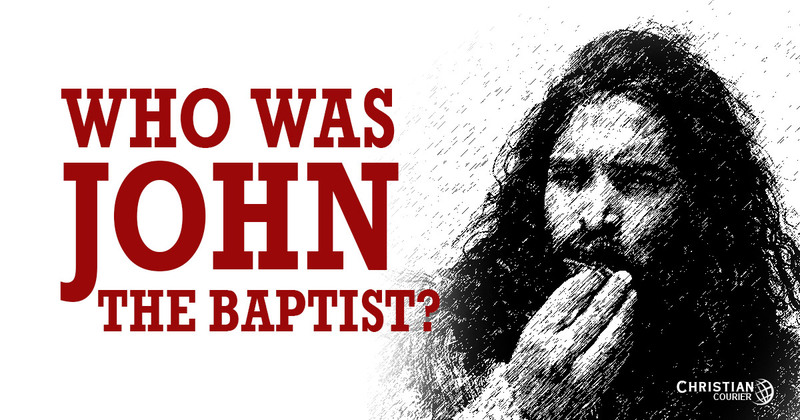In the Book of the Prophet Isaiah, change is promised to the downtrodden exiles from Israel as God will be their Redeemer or in Hebrew, go’el.
[Isaiah 41:14] Redeemer: in Hebrew, go’el, one who frees others from slavery and avenges their sufferings; cf. Lv 25:48; Dt 19:6, 12. Cf. note on Ru 2:20.The Gospel of Matthew, Jesus speaks to the crowds about the Kingdom and the greatness of His messenger, John the Baptist. Kathy Martin reflects that God is the giver of all good gifts.
[Matthew 11:11] John’s preeminent greatness lies in his function of announcing the imminence of the kingdom (Mt 3:1). But to be in the kingdom is so great a privilege that the least who has it is greater than the Baptist.
What connections might we discover between John the Baptist and John of the Cross?
In 1542 Juan de Yepes was born at Fontiveros (Hontiveros), near Avila. The day generally ascribed to this event is June 24 (St. John Baptist's feast day).
Fr. Don Miller, OFM, reflects that we run from the cross. John of the Cross’s message, like the gospel proclaimed by Jesus and previewed by John the Baptist is don’t run if we really want to live.
In his life and writings, John of the Cross has a crucial word for us today. We tend to be rich, soft, comfortable. We shrink even from words like self-denial, mortification, purification, asceticism, discipline. We run from the cross. John’s message—like the gospel—is loud and clear: Don’t—if you really want to live!Wayne Jackson comments that the importance of John in the divine scheme of things probably is summed up best in the testimony of Jesus himself.
The importance of John in the divine scheme of things probably is summed up best in the testimony of Jesus himself. “Among them that are born of women there has not arisen a greater than John the Baptist” (Mt. 11:11).Don Schwager reflects that we proclaim the joy of the Gospel of Christ even in the midst of suffering and violence.
But for most of us our call is to be dry martyrs who bear testimony to the joy of the Gospel in the midst of daily challenges, contradictions, temptations and adversities which come our way as we follow the Lord Jesus. What attracts others to the Gospel of Jesus Christ? When they see Christians loving their enemies, being joyful in suffering, patient in adversity, pardoning injuries, and showing comfort and compassion to the hopeless and the helpless. Jesus tells us that we do not need to fear our adversaries. He will fill us with the power of his Holy Spirit and give us sufficient grace, strength, and wisdom to face any trial and to answer any challenge to our faith. Are you eager to witness to the joy and freedom of the Gospel?Friar Jude Winkler comments on the sense in Deutero Isaiah that the exiled Israelites consider themselves worms and maggots. God, in the first person, promises make them a double edged sledge that cuts down their difficulties.
Fear not. For I am with you. Be not dismayed, For I am God. I will strengthen you. I will help you. I will uphold you with my righteous hand. IJN Amen 🙏🏻 Isaiah 41. pic.twitter.com/nGRbZdXphZ— 'GITMO' BAMA 🎗 (@President1Trump) December 10, 2017
John the Baptist is the new Elijah with a mission to turn the people back to God, Friar Jude notes John prepared the people to turn to the Messiah.
Soundcloud
Fr. Richard Rohr, OFM, quotes Sallie McFague on the twin planetary crises of climate change and unjust financial distribution. She calls for the will to move from belief to action, from denial to profound change at both personal and public levels.
Fr Richard asks “How can we embrace the losses that are happening due to “climate change and unjust financial distribution,” as Sally McFague writes, and move through them into the higher states of consciousness, freedom, and love so urgently needed today?”
We might say that creativity and new life have a cost. The cost looks like death but really isn’t. We perceive death and loss as enemies and afflictions because they appear to be the opposite of life. Spiritually speaking, to somehow embrace loss is to find eternal life. Death allows us to be united with what is really real. To avoid all loss, to avoid all letting go, is to avoid transformation into God, into union, into something more. Wisdom teachers say that if you spend your whole life avoiding dying, you’ll lose your real life.
Reform action in the 16th Century placed John of the Cross in confinement where he expressed the mystical experience of the dark night of the soul. We, unlike John the Baptist, shrink from words like self-denial, mortification, purification, asceticism, and discipline. Christian action being joyful in suffering, patient in adversity, pardoning injuries, and showing comfort and compassion to the hopeless and the helpless is our cross in being witnesses to the transformation necessary to change the consequences of crises in climate change and unjust financial distribution.




No comments:
Post a Comment